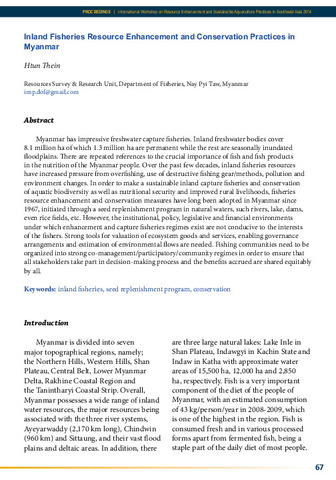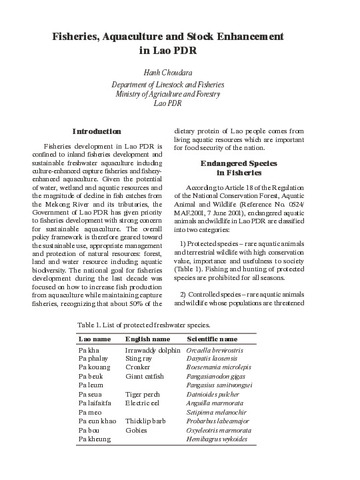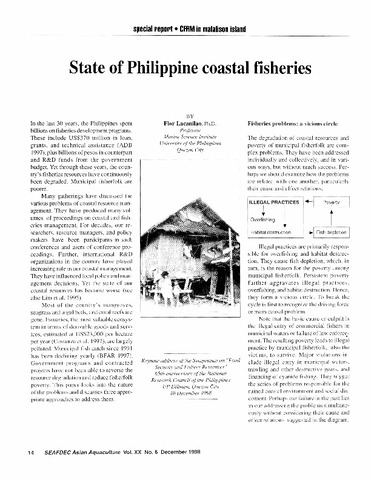Managing fisheries conflicts through communication planning: Experience from inland fisheries of Bangladesh
| dc.contributor.author | Murshed-e-Jahan, Khondker | |
| dc.contributor.author | Salayo, Nerissa D. | |
| dc.contributor.author | Kanagaratnam, Usha | |
| dc.date.accessioned | 2014-05-27T02:42:01Z | |
| dc.date.available | 2014-05-27T02:42:01Z | |
| dc.date.issued | 2009 | |
| dc.identifier.citation | Murshed-e-Jahan, K., Salayo, N. D., & Kanagaratnam, U. (2009). Managing fisheries conflicts through communication planning: Experience from inland fisheries of Bangladesh. Fisheries Research, 99(2), 112-122. | en |
| dc.identifier.issn | 0165-7836 | |
| dc.identifier.uri | http://hdl.handle.net/10862/2097 | |
| dc.description.abstract | Increasing population, ineffective management, competition among fishing gears over access to resources and proliferation of destructive practices are imposing severe stress on the inland water bodies of Bangladesh. These factors also contribute to the increasing incidence of conflicts among fishery stakeholders. When unabated, these conflicts are potential threats to the livelihoods of millions of the poorest fishing communities that depend on these resources. Effective communication between conflicting parties is perceived as a key for establishing successful negotiations for managing conflicts. On this premise, this paper presents and assesses a Fisheries Conflicts Communication Framework, henceforth called FishCom, a tool for developing plans and strategies for managing fisheries conflicts in the inland fisheries of Bangladesh. This tool embodies a structured participatory process intended for use by policy-makers and conflict management practitioners. They have important roles in catalyzing and effecting changes that are instrumental in minimizing, if not totally eliminating conflicts. Experiences from applying FishCom in the inland fisheries study sites in Bangladesh show that it has enabled a systematic stakeholder-inclusive identification and evaluation of fisheries conflicts and planning of communication interventions to manage them. | en |
| dc.description.sponsorship | The authors thank the many stakeholders whose conscientious participation in the series of activities under the Enabling Better Management of Fisheries Conflicts project formed the basis for much of these outputs. The authors are grateful to the Department for International Development-UK, and theWorldFish Center for the generous research funds. The authors would like to acknowledge the two anonymous reviewers for valuable comments. Acknowledgements will also go to Mr. Ben Belton, Ph.D. student, University of Stirling for valuable suggestions. The authors are however responsible for any unforeseen errors and omissions. | en |
| dc.language.iso | en | en |
| dc.publisher | Elsevier | en |
| dc.subject | Bangladesh | en |
| dc.subject | Pisces | en |
| dc.title | Managing fisheries conflicts through communication planning: Experience from inland fisheries of Bangladesh | en |
| dc.type | Article | en |
| dc.identifier.doi | 10.1016/j.fishres.2009.04.009 | |
| dc.citation.volume | 99 | |
| dc.citation.issue | 2 | |
| dc.citation.spage | 112 | |
| dc.citation.epage | 122 | |
| dc.citation.journalTitle | Fisheries Research | en |
| dc.subject.asfa | fishery disputes | en |
| dc.subject.asfa | fishery management | en |
| dc.subject.asfa | inland fisheries | en |
| dc.subject.asfa | fishing gear | en |
| dc.subject.asfa | nature conservation | en |
| dc.subject.asfa | rare species | en |
| dc.subject.asfa | disputes | en |
| dc.subject.asfa | inland waters | en |
| dc.subject.asfa | fisheries | en |
| dc.subject.asfa | communication | en |
| dc.subject.asfa | conflicts | en |
Files in this item
| Files | Size | Format | View |
|---|---|---|---|
|
There are no files associated with this item. |
|||
This item appears in the following Collection(s)
-
Journal Articles [1262]
These papers were contributed by Department staff to various national and international journals.



